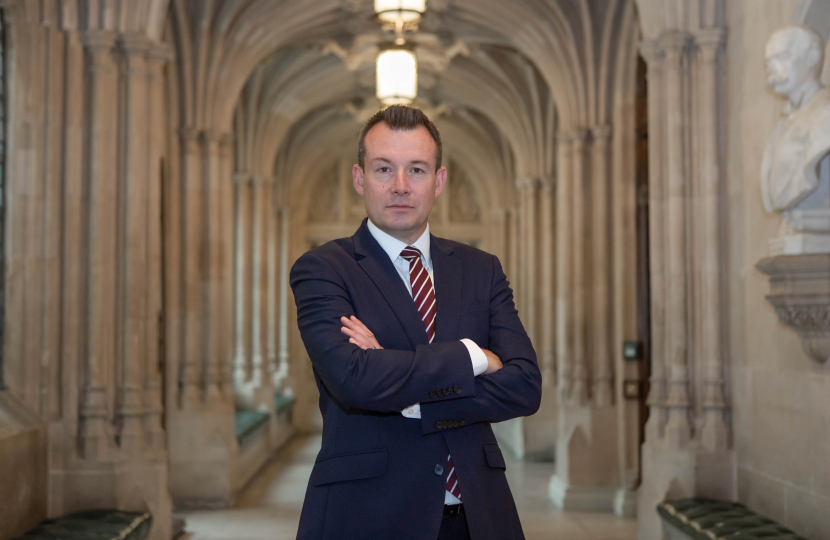
Stuart Anderson MP has intervened in a debate on the government’s plan to impose VAT on independent school fees part way through the academic year. He said that the tax on aspiration will disproportionately affect smaller schools in rural communities like South Shropshire. It will also be the first time that education in the UK has been taxed since the introduction of VAT and could see 134,800 pupils moving to the state sector in the next five years - meaning larger class sizes, disruption for pupils and teachers alike, and increased costs for the taxpayer.
The policy was confirmed as the government's intention via a written statement on 26th July - meaning MPs were not given the opportunity to debate it on the floor of the House of Commons. Stuart and his fellow MPs have now forced a vote on the issue, using one of 17 debates allocated to be decided by His Majesty's Opposition. It follows concerns raised by schools, parents, and unions about the policy being introduced in January - leaving little time for schools, families, and local authorities to plan ahead.
Nine independent schools across the country have already been forced to close since they could not afford an extra 20 per cent charge of VAT without making their fees unviable for parents. Almost three quarters of independent schools fear they will be forced to close. A survey undertaken by the Independent Schools Council (ISC) of 1,185 member schools in the UK found their rolls fell by 1.7% when the school year started last month, compared with 2023. If this was replicated across the country, it could add more than 10,000 pupils to state school rolls and could cost about £80 million.
In South Shropshire, 969 students attend schools in the independent sector including Concord College, Bedstone College, and Moor Park. The new government has refused to publish an impact assessment on the policy until the Budget on 30th October, just nine weeks before the tax is planned to come into effect.
In his intervention, Stuart called on the government to provide certainty to families likely to be affected. Afterwards, he added that the government should publish a full impact assessment of how the tax will impact education in South Shropshire. He also added that the generous bursary system offered by independent schools to many disadvantaged children may decline as a result of the increased costs.
The Opposition has also called on the government to exempt key groups such as those from military families, children with special educational needs, and those who are approaching their exams. Under the continuity of education allowance (CEA), 4,200 children of service personnel receive taxpayer support to attend boarding school while their parents are posted overseas or in frequently changing roles. Worries have been expressed that the tax would effectively render fees unaffordable for these families, even with the allowance. This is because it could triple the cost of education, making a military career less attractive due to disruption caused to their children.
Stuart Anderson MP said:
“This new government has tried to avoid scrutiny of their plans to impose tax on independent education since the policy was announced. So, we used one of our 17 allocated opposition day debates to force a vote on the issue. I believe that this policy is ill-considered and would disproportionately affect rural communities like South Shropshire. It also penalises hard-working parents, who may not be able to afford the higher fees. It could also force a large number of children with special educational needs out of their current school and into the state sector with little tailored support to meet their needs.
Stuart added:
"Taxing independent education is wrong on so many levels; accelerating it without giving adequate time for the sector to prepare is reckless. It risks untold disruption, including for many state schools. The tax may not have much impact on famous-name schools but the ones it will really hit are smaller schools like those in South Shropshire. The government should reconsider this attack on aspiration, personal choice, and social mobility. I believe that hard-working British families should be able to choose where to send their children and that this policy is nothing but the politics of envy.”
In the debate, Stuart said:
Thank you, Madam Deputy Speaker. I rise to speak on this aspiration tax, which I clearly see it as. What I want to just make clear is that all of my children, my five wonderful children, have gone through state schools or are in state schools at the moment. One is in a school that requires improvement because of the catchment we're in. And my education was exceptionally poor. I went to the worst school in the area, I didn't get any GCSEs, and when I was handed my results, the teacher said, 'there you go, Anderson. I told you; you’d never make anything of your life'. It was quite a poor education. So, my experience of education wasn't good. But I'm a Conservative, because I believe in opportunity. I didn't have those opportunities as a child, but I believe everybody should have those opportunities if they want.
Now there's about 1000 children in my constituency that go to Moor Park, Bedstone, and Concord college. And I visited them all. And it's a huge pressure of bringing this tax in, which I believe is rushed, putting the VAT on independent schools has not been thought through, and it does have a massive, massive impact on all of these schools.
Now, some parents will be able to afford it, and they won't feel the pinch. But there's many parents who I've spoken to in my constituency that work two jobs, they have one car, they don't go on holiday, and they do everything they can to give their children the best opportunity in life, and that should be championed. We should not remove these opportunities.
I do believe we should have great state schools across our country. But I also believe that if somebody wants to work hard and strive and have the aspiration to give their children the best opportunity they can, we should not remove that. And we do that at our own cost. So, I grew up with my dad being a soldier, my mum serving in the military as well. So many of my friends at school moved around. They spent two years in a location and moved around. I also have been a soldier, and have had children while I've served in the military. So this is a major impact, and I know that the front bench minister is a supporter of the Armed Forces, and the Secretary of State for Defence has even raised how serious this is for military families.
So as we go into this debate, there will be a lot of to and fro, but I am urging that the government benches, take seriously the impact this will have on military families, and to bring it in blanket will be detrimental, and we will see people leave the Armed Forces at the cost of this. And it's not a good way to do that. So I'm asking for time. Can we push this back? Because you have talked about what you're going to do to fill this gap of recruiting more people, raising the standard of state schools. That is not going to happen by January. That is not going to happen. So we need to look at a time of to bring this in. Mid-term doesn't work. The impact it's going to have on SEND. People who've got the aspiration to send their children to this private education.
But what is important to me and many of my constituents is the military families. So I'm urging the government to go away, think about this, come very quickly out about military families, because people are making decisions whether they stay or they sign off in their time in the Forces, and we need our great men and women across the Armed Forces to have that certainty that their children's education is not going to be disrupted.
Stuart's speech can be viewed at https://parliamentlive.tv/event/index/e0174cdd-68ee-403d-9ace-4e128169c….





